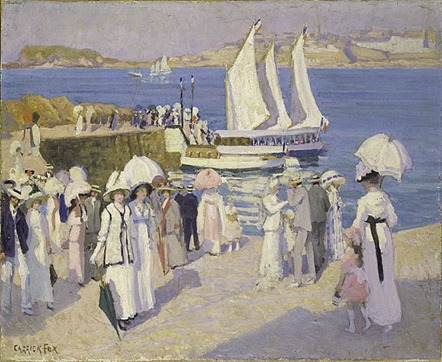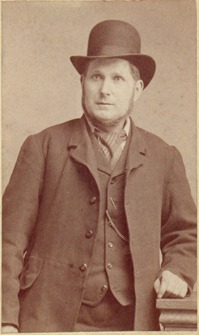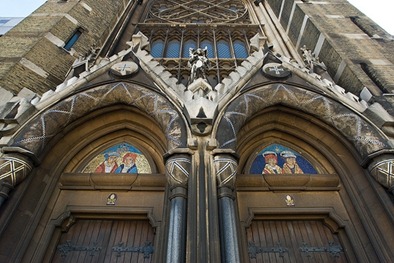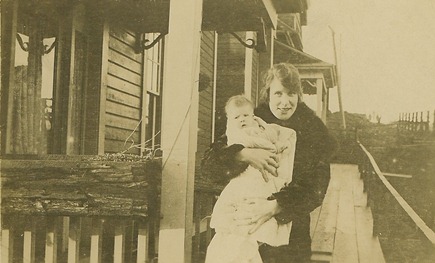Black sheep embarrass the family whilst they are alive but they make wonderful ancestors. Brushes with the law, financial peccadilloes and sex scandals are the lifeblood of newspapers. Ancestors who got into serious trouble usually got plenty of column inches and those old newspaper articles are gold dust for the family historian.
My favourite black sheep ancestor is my 2x great-grandfather, Rev Frederick Davis. Not just a bad boy but a clergyman to boot - some years ago a cousin christened him "the pervy vicar" and I'm afraid the naughty nickname has stuck.
Frederick was born in
Lambeth, Surrey, in 1821. One family story suggests that his father was wealthy but disowned him after an argument. Frederick was certainly well educated but struggled for the rest of his life to establish a financially secure career.
At first he worked as a warehouseman. In 1842 he married a schoolmistress, Charlotte Aves, and by 1848 Frederick had also become a schoolmaster, following teacher training at the Church of England
National Society's Training Institution in Westminster.
Frederick and Charlotte worked as a husband and wife team in a succession of church schools in East London, Essex, Staffordshire and Worcestershire. By 1858 they were running the parish school in
St Columb Major, Cornwall, when tragedy struck. Charlotte died of tuberculosis, aged 40, leaving Frederick with eight children aged two to fifteen.
 |
| Headstone on the grave of Charlotte Davis, Colan, Cornwall |
With Charlotte's death the family lost stability. Frederick initially put his daughters into an
orphanage run by Anglican nuns at Wymering, near Portsmouth. By 1862 he had moved to Torquay in Devon where, for the first time, he set up his own private school rather than being employed by the Church. On the recommendation of clerical friends, he was also ordained deacon by the Bishop of Exeter and appointed curate of
St John's, Torquay.
This proved disastrous. The curacy was poorly paid but so busy as to prevent him running his school properly. He lost pupils, fell out with the vicar and, within six months found himself in precarious financial circumstances. Although supposed to remain in the diocese until he was ordained priest, Frederick petitioned the Bishop to allow him to leave his curacy and move to
Northfleet in Kent, to take over a private preparatory school based in the old
Manor House.
 |
| The Manor House, Northfleet, Kent |
Frederick rebranded the school as Northfleet Grammar School, later the Collegiate School, and advertised his willingness to coach young men for entry to the Universities and the armed forces. Some pupils came (two of them later married two of his daughters) but the school struggled and Frederick supplemented his income by covering for clergy absences in various Kent parishes, not telling them that he was only in deacon's orders.
Having been prompted to make enquiry concerning his private character in consequence of his having most persistently and impudently attempted to extort more money (to the extent of 4 guineas) than he was entitled to according to my agreement with him, I have ascertained from a most reliable source that he is
inhibited by the
Bishop of Rochester from doing duty in his diocese.
...
Dr Claughton would not have inhibited him, unless there were good and weighty reasons for so doing. I
have heard what those reasons are, but would rather not commit them to writing as they are of a most serious and damaging nature. No doubt if Your Grace orders inquiry to be made in the neighbourhood in which he lives quite sufficient cause will be found, to induce Your Grace to take immediate steps to prevent the possibility of his ever performing the duty of a clergyman of the Church of England again.
| |
Archibald Campbell Tait, 1811-1882
Archbishop of Canterbury |
The
Bishop of Rochester added his own disapprobation:
I have not actually inhibited Mr Davis ... but I do not approve of him. He behaves extremely ill to the Clergyman of his Parish.
 |
Thomas Legh Claughton, 1808-1892
Bishop of Rochester |
By 1875 Frederick had given up his school in favour of running a home for six wealthy dipsomaniacs (alcoholics). Following complaints that a lady was being detained against her will, the
Lunacy Commissioners paid a visit and discovered that one of his patients was mentally ill. In the summer of 1877 he was prosecuted for running an unlicensed lunatic asylum and fined £50.
The Archbishop had reluctantly allowed Frederick to continue officiating in neighbouring parishes. On Sunday 16 December 1877 he was returning from taking services when, on a train between
Strood and
Gravesend, he was alleged to have indecently assaulted a 17 year old servant girl called Rosina Webb. When the case came up for trial in January 1878 Frederick did not appear. Instead, one of his sons wrote a letter maintaining his father's innocence but saying that, as he feared his word would not be believed, he had gone abroad.
A warrant was issued for Frederick's arrest and an advertisement in the Police Gazette gives us a description of the man, for whom no known photograph exists:
 |
| The Police Gazette, 4 February 1878 |
When Frederick fled abroad he left behind him a second wife. Her existence only came to light because her birth and death dates, minus a name, were recorded on a family gravestone in Northfleet churchyard. The gravestone was destroyed in the 1960s but, thankfully, it had been carefully transcribed by an antiquarian in the 1900s. The death date led to the discovery of the name Harriet Davis in the Northfleet burial registers. Her death certificate revealed that she was the wife of Frederick Davis and that she had died of apoplexy in October 1878, aged 60. No record of their marriage has yet been found.
Frederick went first to
Bruges in Belgium before settling in
Dinard on the coast of Brittany in France. Both places had substantial numbers of affluent English residents, so Frederick was probably able to earn a living as a tutor. There was an
Anglican church at Dinard and the incumbent,
Rev Anthony Francis Thomson, was the father of one of Frederick's old pupils,
Anthony Standidge Thomson, later to be his son-in-law. Frederick lived in the pretty seaside resort - no doubt helping out with services - until his death in 1883.



















